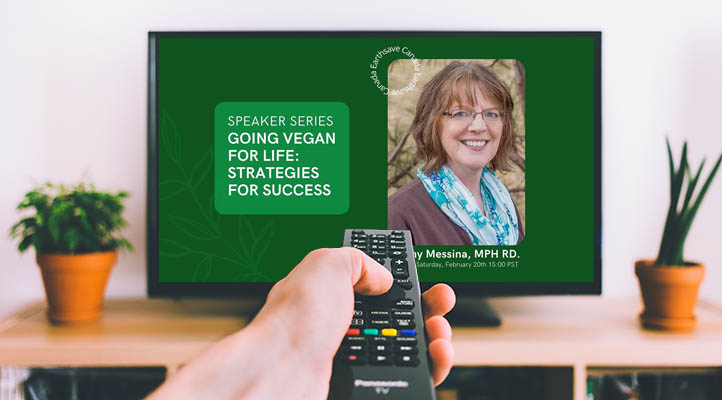As part of our Virtual Speaker Series, Virginia (Ginny) Messina, MPH, RD gave a talk drawing from her book Vegan for Life. You can watch the entire talk including questions from the audience here:
Below, I summarize some key points from this very informative talk. For more information I strongly recommend getting your hands on a copy of Vegan for Life which covers these topics, and many others, in more detail.
Be smart about nutrition
The first half of the talk focuses on a few specific aspects of nutrition that vegans should be aware of, namely protein, calcium, essential fats, supplements, and iron. I’ve included the timestamp for each section if you’d like to jump there in the video.
Protein [3:22]
It is easy to get enough protein on a vegan diet. While all plant foods contain all the essential amino acids, to get adequate amounts of each it’s important to eat a variety of plant foods. In particular, the consumption of legumes (e.g. soy foods, peanuts, beans, peas, and lentils) is an easy way to get adequate amounts of lysine.
Calcium [6:27]
Long before dairy was a staple part of the human diet, calcium needs were being easily met by foraged wild greens. It’s important to focus on cruciferous and leafy green vegetables with lower amounts of oxalates, since oxalates hinder the absorption of calcium. The calcium in bok choy, napa cabbage, broccoli, collards, kale, mustard greens, and turnip greens is easily absorbed. However, due to high oxalate content, the calcium in spinach, swiss chard, and beet greens is not well absorbed.
Fortified foods can be a reliable source of calcium, such as calcium-set tofu, fortified plant milks, and fortified juices.
Essential fats [9:08]
The short chain fatty acid ALA (an essential omega-3 fat) can be found in large quantities in only a few plant foods so it’s important to include some of these in your diet. Ground flax or chia seeds, hemp seeds, walnuts, or oils from these nuts and seeds are the main sources. Only small quantities are needed per day, for example one tablespoon of ground flax seeds.
The long chain omega-3 fats, DHA and EPA, may be helpful to reduce risks of heart disease, dementia and depression. However, the current research is not sufficient to make strong recommendations. It may be prudent to include a supplement until more is known. Vegans can find omega-3 supplements derived from algae instead of fish.
Supplements for vegans [13:30]
There are two forms of vitamin D, D2 and D3. D3 is most commonly derived from animal sources, but is important in reversing vitamin D deficiency. Either form is adequate for maintaining vitamin D status in those who are not deficient. If you are deficient it is possible to find vegan forms of D3, but be careful to research them.
The only reliable sources of vitamin B12 are supplements and fortified foods. It’s important to include a reliable source of vitamin B12 in your diet.
While iodine is present in some vegetables, and especially in sea vegetables, these are not reliable sources. It’s important to include at least a small amount of iodized salt or an iodine supplement to ensure adequate intake.
Iron [23:18]
Plant foods can be very high in iron, however, phytates in plant-foods can reduce absorption. This can be countered by including a source of vitamin C with your meal which can dramatically increase the absorption of iron. Be mindful to pair iron-rich foods, such as legumes, whole grains, nuts, seeds, leafy green vegetables, dried fruits, and blackstrap molasses with vitamin C rich foods, such as citrus fruits, strawberries, green leafy vegetables, peppers, cauliflower, and cabbage. Also avoid consuming coffee or tea with meals because they can reduce absorption of iron.
Long term success
The second half of the talk covers practical issues that many people interested in veganism face.
Set your own pace [28:33]
While some people are comfortable quickly transitioning to a vegan diet, many others need to take more time to fully transition. Making consistent manageable changes will help ensure that you don’t become overwhelmed while you move toward your goal.
Embrace your cooking and eating style [31:17]
Veganism is not a single way of eating. For example, it is possible to eat low-carb or ketogenic diets while vegan. Veganism isn’t a single style of cooking either; you don’t need to love cooking or have expensive kitchen tools to cook satisfying vegan meals. With limited time and basic cooking skills many delicious and satisfying meals can be made. Convenience foods can play a role here as well. However, if you do like gourmet cooking there are lots of opportunities to make fancy vegan meals.
Satisfy Cravings [35:09]
Cravings for animal foods are not uncommon while transitioning to veganism, but it’s important to know you don’t have to stop being vegan to satisfy these cravings. These cravings are for the textures and flavors that you’re accustomed to. Try seeking out some plant foods with lots of umami flavor such as nutritional yeast, sea vegetables, sun dried tomatoes, and shitake mushrooms. Or try some vegan meats to find those familiar textures.
Food shaming [39:17]
There is sometimes shame around processed foods in the vegan community, setting up a false dichotomy between the junk-food and whole-food vegan. However, most vegans include many fruits, vegetables, whole grains, and legumes in their diets. Processed foods such as vegan meats, oils, and milks are not equivalent to cookies and potato chips. In fact these processed foods are found in many traditional and healthy plant-based diets.
We should all work to avoid indiscriminately stigmatizing processed foods.
Honor your progress [41:56]
Missteps on your journey to veganism may happen and it’s important to honor the progress you’ve made and your intentions for the future instead of dwelling on a mistake. Sometimes our habits lag behind our intentions, be aware of that, celebrate the changes you have made and continue to move forward.
Manage expectations [43:07]
Veganism is not a miracle diet. It’s true that vegans on average have lower BMIs, but that doesn’t mean that weight loss is inevitable if you go vegan. It’s true that vegans may have lower risk for diabetes, heat disease, and some cancers, but vegans still get chronic diseases.
Setting unrealistic expectations can result in people abandoning veganism if those expectations are not being met. Instead if we center our expectations on reducing our contribution to animal exploitation and shrinking our carbon footprint then our expectations are guaranteed to be met and this can help form a long-term commitment.
Photo by freestocks on Unsplash




